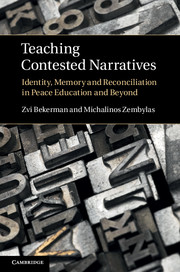In troubled societies narratives about the past tend to be partial and explain a conflict from narrow perspectives that justify the national self and condemn, exclude and devalue the 'enemy' and their narrative. Through a detailed analysis, Teaching Contested Narratives reveals the works of identity, historical narratives and memory as these are enacted in classroom dialogues, canonical texts and school ceremonies. Presenting ethnographic data from local contexts in Cyprus and Israel, and demonstrating the relevance to educational settings in countries which suffer from conflicts all over the world, the authors explore the challenges of teaching narratives about the past in such societies, discuss how historical trauma and suffering are dealt with in the context of teaching, and highlight the potential of pedagogical interventions for reconciliation. The book shows how the notions of identity, memory and reconciliation can perpetuate or challenge attachments to essentialized ideas about peace and conflict.
• Offers social and anthropological perspectives into the theoretical underpinnings and practical implications of peace education in troubled societies • Reveals how the notions of identity, memory and reconciliation are entangled and perpetuate or challenge attachments to essentialized ideas about peace and conflict • Renders data from local contexts in Cyprus and Israel showing them to be relevant to educational settings in countries which suffer from strong conflicts - in America, Europe, Africa and so on
Contents
Part I. Introduction and Theoretical Underpinnings: 1. Introduction; 2. Problematizing peace education romanticism; 3. On conflict, identity and more; Part II. Living and Teaching Contested Narratives: 4. Victims and perpetrators: how teachers live with contested narratives; 5. (Im)possible openings; 6. The everyday challenges of teaching children from conflicting groups; 7. The emotional complexities of teaching contested narratives; Part III. Mourning, Forgiveness and Reconciliation: Problems and Possible Solutions: 8. The nationalization of mourning in troubled societies; 9. The work of mourning in schools: ambivalent emotions and the risks of seeking mutual respect and understanding; 10. Forgiveness as a possible path towards reconciliation; Part IV. Conclusions: Implications for Peace Education: 11. Becoming critical design experts in schools; 12. Memory and forgetting: a pedagogy of dangerous memories; 13. De-essentializing identity; 14. Designing different paths for reconciliation pedagogies.
Reviews
'This is a critically important analysis of assumptions in peace education, based on a rich corpus of research in Israeli and Cypriot classrooms. The analysis challenges assumptions about our understanding of identity, memory and reconciliation, and challenges us to help children envisage and realise alternative futures.' Tony Gallagher, Professor of Education and Pro Vice Chancellor, Queen's University, Belfast
'… a most compelling ethnographic comparative study of education that deals with issues of conflicting memories, identities and historical narratives in divided societies. It raises serious questions that challenge the prevailing psychologically oriented and Western-based epistemologies of peace education. Being written for both professionals and practitioners, it is a must read for anybody in the field of reconciliation, peace education and forgiveness.' Gabi Salomon, Professor Emeritus and Head of the Center for Research on Peace Education, Haifa University, Israel


